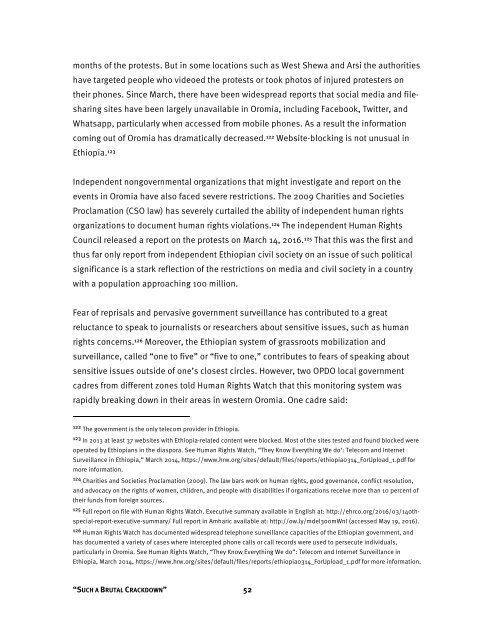“Such a Brutal Crackdown”
ethiopia0616web
ethiopia0616web
You also want an ePaper? Increase the reach of your titles
YUMPU automatically turns print PDFs into web optimized ePapers that Google loves.
months of the protests. But in some locations such as West Shewa and Arsi the authorities<br />
have targeted people who videoed the protests or took photos of injured protesters on<br />
their phones. Since March, there have been widespread reports that social media and filesharing<br />
sites have been largely unavailable in Oromia, including Facebook, Twitter, and<br />
Whatsapp, particularly when accessed from mobile phones. As a result the information<br />
coming out of Oromia has dramatically decreased. 122 Website-blocking is not unusual in<br />
Ethiopia. 123<br />
Independent nongovernmental organizations that might investigate and report on the<br />
events in Oromia have also faced severe restrictions. The 2009 Charities and Societies<br />
Proclamation (CSO law) has severely curtailed the ability of independent human rights<br />
organizations to document human rights violations. 124 The independent Human Rights<br />
Council released a report on the protests on March 14, 2016. 125 That this was the first and<br />
thus far only report from independent Ethiopian civil society on an issue of such political<br />
significance is a stark reflection of the restrictions on media and civil society in a country<br />
with a population approaching 100 million.<br />
Fear of reprisals and pervasive government surveillance has contributed to a great<br />
reluctance to speak to journalists or researchers about sensitive issues, such as human<br />
rights concerns. 126 Moreover, the Ethiopian system of grassroots mobilization and<br />
surveillance, called “one to five” or “five to one,” contributes to fears of speaking about<br />
sensitive issues outside of one’s closest circles. However, two OPDO local government<br />
cadres from different zones told Human Rights Watch that this monitoring system was<br />
rapidly breaking down in their areas in western Oromia. One cadre said:<br />
122 The government is the only telecom provider in Ethiopia.<br />
123 In 2013 at least 37 websites with Ethiopia-related content were blocked. Most of the sites tested and found blocked were<br />
operated by Ethiopians in the diaspora. See Human Rights Watch, “They Know Everything We do’: Telecom and Internet<br />
Surveillance in Ethiopia,” March 2014, https://www.hrw.org/sites/default/files/reports/ethiopia0314_ForUpload_1.pdf for<br />
more information.<br />
124 Charities and Societies Proclamation (2009). The law bars work on human rights, good governance, conflict resolution,<br />
and advocacy on the rights of women, children, and people with disabilities if organizations receive more than 10 percent of<br />
their funds from foreign sources.<br />
125 Full report on file with Human Rights Watch. Executive summary available in English at: http://ehrco.org/2016/03/140thspecial-report-executive-summary/<br />
Full report in Amharic available at: http://ow.ly/mdel300mWnI (accessed May 19, 2016).<br />
126 Human Rights Watch has documented widespread telephone surveillance capacities of the Ethiopian government, and<br />
has documented a variety of cases where intercepted phone calls or call records were used to persecute individuals,<br />
particularly in Oromia. See Human Rights Watch, “They Know Everything We do”: Telecom and Internet Surveillance in<br />
Ethiopia, March 2014, https://www.hrw.org/sites/default/files/reports/ethiopia0314_ForUpload_1.pdf for more information.<br />
“SUCH A BRUTAL CRACKDOWN” 52


